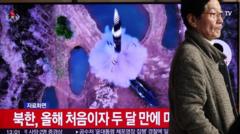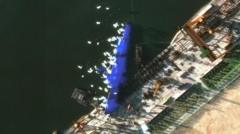North Korea has conducted its first missile test in two months, launching an intermediate-range ballistic missile into the sea as tensions rise with ongoing political strife in South Korea and diplomatic talks with the United States.
North Korea Resumes Missile Testing Amid Political Turmoil in South Korea

North Korea Resumes Missile Testing Amid Political Turmoil in South Korea
Pyongyang's latest missile launch coincides with US Secretary of State Antony Blinken's visit to Seoul amid internal upheaval in the South.
The article text:
North Korea has reignited tensions on the Korean Peninsula by launching what appears to be an intermediate-range ballistic missile, marking its first military test in two months. The missile reportedly flew approximately 1,100 kilometers before plunging into the sea, an act that South Korea’s military has condemned as a "clear act of provocation." This event coincides with US Secretary of State Antony Blinken's visit to Seoul for high-stakes discussions with South Korean leaders.
During his visit, Blinken met with Acting President Choi Sang-mok, where he reaffirmed the alliance between the United States and South Korea, stating that it serves as a "cornerstone of peace and stability" in the region. In response to the missile launch, South Korea's military has intensified surveillance measures and is collaborating closely with both the US and Japan to monitor potential North Korean activities.
The timing of the missile launch is particularly notable given the ongoing political chaos in South Korea. This turmoil has stemmed from suspended President Yoon Suk Yeol's controversial martial law attempt last December, which led to his impeachment and subsequent stripping of presidential powers. The constitutional court is currently deliberating whether Yoon should be officially removed from office. North Korea has criticized Yoon’s martial law declaration, likening it to a "fascist dictatorship" and mocking the government's internal struggles.
Historically, North Korea's missile launches have often corresponded with significant events, including military drills conducted by the US and its allies. The last recorded missile test occurred in November, just before the US presidential election, suggesting a pattern of provocations aligned with major political happenings. Earlier this month, North Korea also faced international scrutiny regarding its military maneuvers, including allegations of its forces participating in the ongoing conflict in Ukraine.
As both North Korea and South Korea navigate their respective crises, the international community watches closely, aware that each missile launch and political development could dramatically shift the dynamics of the region.
North Korea has reignited tensions on the Korean Peninsula by launching what appears to be an intermediate-range ballistic missile, marking its first military test in two months. The missile reportedly flew approximately 1,100 kilometers before plunging into the sea, an act that South Korea’s military has condemned as a "clear act of provocation." This event coincides with US Secretary of State Antony Blinken's visit to Seoul for high-stakes discussions with South Korean leaders.
During his visit, Blinken met with Acting President Choi Sang-mok, where he reaffirmed the alliance between the United States and South Korea, stating that it serves as a "cornerstone of peace and stability" in the region. In response to the missile launch, South Korea's military has intensified surveillance measures and is collaborating closely with both the US and Japan to monitor potential North Korean activities.
The timing of the missile launch is particularly notable given the ongoing political chaos in South Korea. This turmoil has stemmed from suspended President Yoon Suk Yeol's controversial martial law attempt last December, which led to his impeachment and subsequent stripping of presidential powers. The constitutional court is currently deliberating whether Yoon should be officially removed from office. North Korea has criticized Yoon’s martial law declaration, likening it to a "fascist dictatorship" and mocking the government's internal struggles.
Historically, North Korea's missile launches have often corresponded with significant events, including military drills conducted by the US and its allies. The last recorded missile test occurred in November, just before the US presidential election, suggesting a pattern of provocations aligned with major political happenings. Earlier this month, North Korea also faced international scrutiny regarding its military maneuvers, including allegations of its forces participating in the ongoing conflict in Ukraine.
As both North Korea and South Korea navigate their respective crises, the international community watches closely, aware that each missile launch and political development could dramatically shift the dynamics of the region.




















